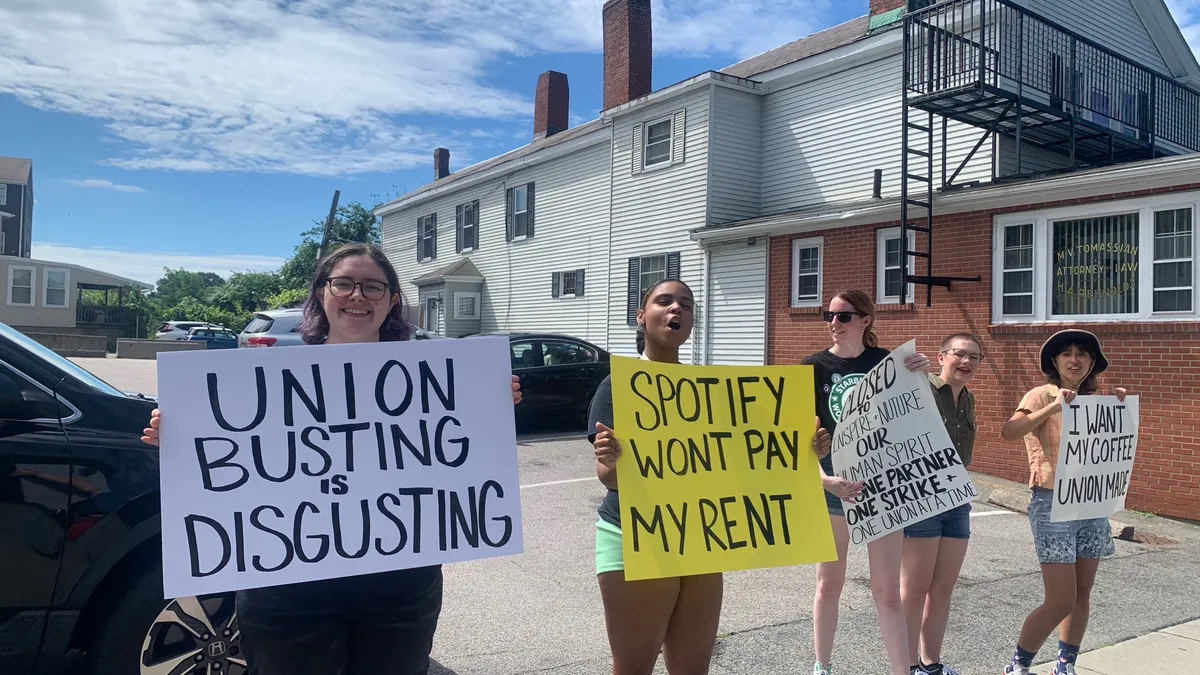Dive Brief:
- Starbucks on Thursday said it will fight a National Labor Relations Board Administrative Law Judge’s ruling that the company adopted “a corporate-wide antiunion policy of explicitly conditioning eligibility for increased enhanced wages and benefits on its employees’ refraining from seeking union representation.”
- The coffee giant plans to appeal or file exceptions to the ALJ decision, which would put the case before the full National Labor Relations Board.
- While Starbucks has denied it increased wages and strengthened benefits to discourage unionization, the denial of benefits to union stores — along with a host of other alleged union-busting tactics — have slowed the pace of Starbucks Workers United’s organizing and driven up turnover at union stores.
Dive Insight:
If Judge Mara-Louise Anzalone’s decision withstands a board appeal, as well as the federal court case likely to follow, Starbucks would have to give backpay and extend benefits to impacted union workers at hundreds of stores, and distribute a variety of notices to employees on their rights under the National Labor Relations Act.
Such remedies would serve as a significant symbolic victory for SBWU, though more than a year has already passed since the implementation of those benefits. The union faces new challenges, as well — decertification drives, backed by anti-union group the National Right to Work Foundation, have begun to crop up at union stores.
Starbucks argued the judge’s decision was contrary to settled labor law, as employers are barred from making unilateral changes to wages and benefits at locations represented by unions.
Anzalone said in her decision that Starbucks’ explanation “ignores two basic aspects of the law.”
“Had [Starbucks] in fact wished to give its unionized partners the same increases it granted its nonunion partners, it could have simply asked the Union for permission and thereafter granted the increase without violating the law,” Anzalone wrote. Anzalone also argued the company could have deferred some benefits or raised wages to avoid the appearance of election interference as long as it did so without “blaming the increase on the presence of union organizing.”
More than a year ago, Lynne Fox, president of Workers United, said the union would waive its right to bargain over the changes Starbucks implemented in 2022. Starbucks did not respond to a request to clarify whether it ever sought to bargain with Workers United over the benefits changes.
Anzalone also argued that the company’s insistence that its hands were bound were part of a “carrot and stick” tactic by which an employer “promises a benefit solely for the purpose of withholding it from unionized or unionizing employees under the guise of avoiding the commission of an unfair labor practice.” That approach “has the added perk of blaming the union (and/or the labor law itself) for the employees’ predicament.”
According to the decision, Starbucks executives, in internal communications in March 2022, increased the seniority raises the company was offering explicitly to counter the success pro-union workers had in organizing other workers around seniority pay as a demand. This process, and the company’s “collaboration sessions,” could constitute an illegal solicitation of grievances, meaning that the company designed the policies specifically to counter the concerns workers expressed when organizing.
Starbucks, in its announcement that it would appeal Anzalone’s decision, claimed the judge’s order created a situation “where employers violate the law if they unilaterally include organizing or unionized employees when making changes in wages and benefits and violate the law if they do not do so.”












